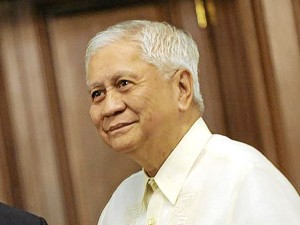
Foreign Secretary Albert del Rosario asserted that Asean members “must muster the will as an Asean community to face these sensitive issues with determination.”
The Philippines and Vietnam on Monday discussed “cooperative actions” in the West Philippine Sea (South China Sea) during the inaugural meeting of the two countries’ Joint Commission on Maritime and Ocean Cooperation (JCMOC), according to the Department of Foreign Affairs (DFA).
Among issues taken up at the first JCMOC meeting were Manila’s proposal for the establishment of a Zone of Peace, Freedom, Friendship and Cooperation in the disputed sea, as well as a Code of Conduct for Spratlys claimant-countries, the DFA said.
Aside from the Philippines and Vietnam, all or part of the Spratlys island chain are also being claimed by China, Taiwan, Malaysia and Brunei.
The DFA did not provide details of the conference, which it said aimed to “achieve a more responsive and effective mechanism for bilateral cooperation on maritime and ocean concerns.”
Foreign Undersecretary for Policy Erlinda Basilio headed the 10-member Philippine panel in the JCMOC.
The 16-man Vietnamese side was headed by Deputy Foreign Minister Ho Xuan Son.
Son called on Foreign Secretary Albert del Rosario before the start of the meeting held at DFA headquarters in Pasay City.
Holding the JCMOC meeting at the deputy foreign minister level was agreed upon by both governments in October.
Resolve claims
In January, Del Rosario called again on Vietnam and the eight other members of the Association of Southeast Asian Nations (Asean) to call a meeting of Spratlys claimant-countries, including China, to resolve the conflicting claims in the West Philippine Sea.
The secretary made the call during the Asean foreign ministers meeting in Siem Reap, Cambodia.
Del Rosario said Asean was “at a critical juncture of playing a momentous role in the resolution of disputes in the West Philippine Sea based on the rules-based regime of the United Nations Convention on the Law of the Sea,” or Unclos.
Muster will
He asserted that Asean members “must muster the will as an Asean community to face these sensitive issues with determination.”
Del Rosario urged Asean members to “now play a positive and meaningful role to solve the disputes peacefully in accordance with the Treaty of Amity and Cooperation and reach a stage whereby we are able to help resolve sensitive issues decisively without letting such issues fester and adversely affect the progress of our bilateral and multilateral decisions.”